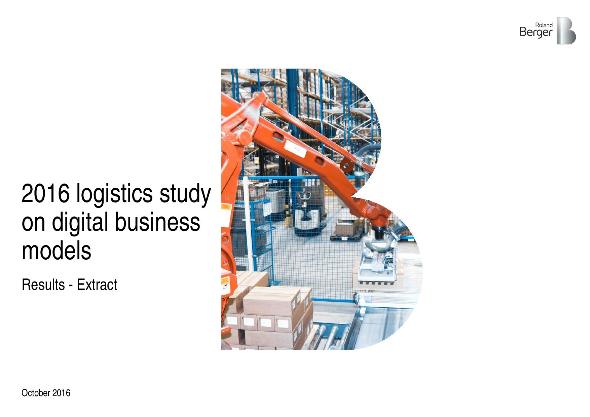2016 logistics study on digital business models (Switzerland)
![{[downloads[language].preview]}](https://www.rolandberger.com/publications/publication_image/cover_roland_berger_logistikbranche_in_der_zwickm_hle_page_001_download_preview.jpg)
Results - Extract



As the unassuming container celebrates its 50th birthday, a new revolution in the logistics sector is imminent. The 2016 logistics study on digital business models by Roland Berger shows an early start is essential to prepare for the digital age. With study results drawn from the responses of 300 logistics companies and service providers across 19 countries, extensive insight can be gleaned from this exclusive report. Digitization is already making its presence known. This is confirmed by a resounding 95 percent of survey participants.

Questions abound about the impact of digitization market structure and disagreement between players is running rife. Data security is seen as one of the biggest challenges as companies worry about the potential loss of sensitive data if they collaborate with competitors or IT firms.
Digital transformation is a key task that needs to be performed by introducing employees to digital thinking and implementing new ways of IT project management.

Roland Berger experts have identified four business models, within which market players are likely to fall in the future:
The logistics sector is challenged with adapting to challenges being thrown at it by digitization. New trends and technologies are emerging making it imperative that players remain open. No one can predict exactly what is going to happen, but it is important to be prepared for dramatic changes ahead.
Roland Berger experts have identified four business models, within which market players are likely to fall in the future:
The logistics sector is challenged with adapting to challenges being thrown at it by digitization. New trends and technologies are emerging making it imperative that players remain open. No one can predict exactly what is going to happen, but it is important to be prepared for dramatic changes ahead.
![{[downloads[language].preview]}](https://www.rolandberger.com/publications/publication_image/cover_roland_berger_logistikbranche_in_der_zwickm_hle_page_001_download_preview.jpg)
Results - Extract